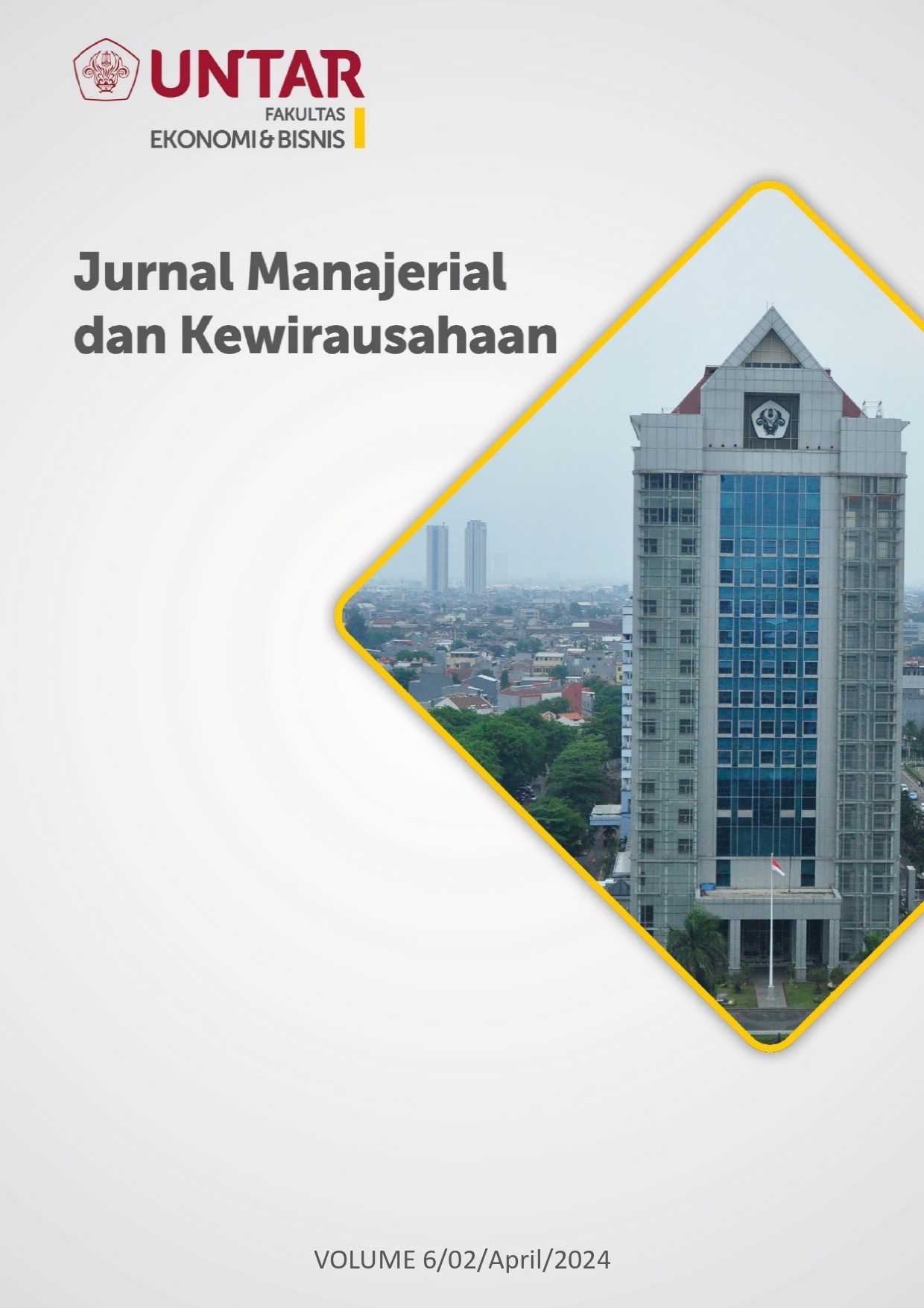Pengaruh Modal Relasional terhadap Kinerja Inovasi dengan Moderasi Pemberdayaan Kepemimpinan pada Perusahaan di Jakarta
Main Article Content
Abstract
Innovation performance is considered a key element in achieving competitive company growth advantages in the long term. A deep understanding of the factors influencing innovation performance is essential to business strategy. Relational capital, which includes trust, reciprocity, and transparency, influences innovation performance. This research was conducted to investigate the influence of relational capital on innovation performance, which is moderated by empowering leadership. The population in this study consisted of company employees who are commercial managers in Jakarta, with a sample of 80 respondents. The sampling method uses a non-probability sampling method with purposive sampling technique by distributing questionnaires online. Data were analyzed using partial least squares (PLS) analysis with the help of SmartPLS version 4. The results show that trust and reciprocity influence innovation performance positively and significantly, while transparency does not considerably influence innovation performance. Meanwhile, empowering leadership moderates the relationship between trust and innovation performance positively and significantly. Moderation from transparency is negative and significant, while reciprocal moderation is negative and insignificant. The results of this research can provide input for companies to improve innovation performance by focusing on relational capital and empowering leadership.
Article Details
Section

This work is licensed under a Creative Commons Attribution-NonCommercial-ShareAlike 4.0 International License.
This work is licensed under a Jurnal Muara Ilmu Ekonomi dan Bisnis Creative Commons Attribution-ShareAlike 4.0 International License.,/p>
References
Amundsen, S. & Martinsen, O. L. (2014). Empowering Leadership: Construct Clarification, Conceptualization, and Validation of A New Scale. The Leadership Quarterly, 25(3), 487-511.
Blonska, A., Storey, C., Rozemeijer, F., Wetzels, M., & de Ruyter, K. (2013). Decomposing the Effect of Supplier Development on Relationship Benefits: The Role of Relational Capital. Industrial Marketing Management, 42(8), 1295-1306.
Cantner, U., Meder, A., & Wolf, T. (2011). Success and Failure of Firms’ Innovation Co-Operations: The Role of Intermediaries and Reciprocity: Intermediation, Reciprocity and Innovation Co-Operations. Papers in Regional Science, 90(2), 313-329.
Cohen, S.G., Chang, L., & Jr, G.E.L. (2010). A hierarchical construct of self-management leadership and its relationship to quality of work life and perceived work group effectiveness, Personnel Psychology, Vol. 50 No. 2, pp. 275-308.
Dionysus, R. & Arifin, A. Z. (2020). Strategic Orientation on Performance: The Resource Based View Theory Approach. Jurnal Akuntansi, 24(1), 136-153. https://doi.org/10.24912/ja.v24i1.661
Duan, Y., Liu, S., Cheng, H., Chin, T., & Luo, X. (2021). The moderating effect of absorptive capacity on transnational knowledge spillover and the innovation quality of high-tech industries in host countries: evidence from the Chinese manufacturing industry, International Journal of Production Economics, Vol. 233, 108019.
Etikan, I., Musa, S. A., & Alkassim, R. S. (2016). Comparison of convenience sampling and purposive sampling, American Journal of Theoretical and Applied Statistics, 5(1), 1-4.
Ghozali, I., Latan, H. (2012). Partial Least Square. Konsep Teknik dan Aplikasi Smart PLS 2.0, Semarang: Badan Penerbit Universitas Diponegoro.
Hair, J., Hult, T., Ringle, C., & Sarstedt, M. (2014). A Primer on Partial Least Squares Structural Equation Modeling. In Long Range Planning (Vol. 46, Issues 1–2). https://doi.org/10.1016/j.lrp.2013.01.002
Hu, B. (2014). Linking business models with technological innovation performance through organizational learning, European Management Journal, Vol. 32 No. 4, pp. 587-595.
Jufri, A., Kurniawan, P., Djadjuli, M., & Hadiwibowo, I. (2021). RBV Teori: Kinerja Religius Berbasis Kepribadian Islam dan Perilaku Inovatif Dalam Konseptual. INOBIS: Jurnal Inovasi Bisnis dan Manajemen Indonesia, 4(3), 375-388.
Kearney, E., Shemla, M., van Knippenberg, D. and Scholz, F.A. (2019). A paradox perspective on the interactive effects of visionary and empowering leadership, Organizational Behavior and Human Decision Processes, Vol. 155, pp. 20-30
Kohtamaki, M., Vesalainen, J., Henneberg, S., Naude, P., & Ventresca, M.J. (2012). Enabling relationship structures and relationship performance improvement: the moderating role of relational capital, Industrial Marketing Management, Vol. 41 No. 8, pp. 1298-1309.
Lee, A., Willis, S., & Tian, A.W. (2018). Empowering leadership: a meta-analytic examination of incremental contribution, mediation, and moderation, Journal of Organizational Behavior, Vol. 39 No. 3, pp. 306-325.
Li, G., Shang, Y., Liu, H., & Xi, Y. (2014). Differentiated transformational leadership and knowledge sharing: a cross-level investigation, European Management Journal, Vol. 32 No. 4, pp. 554-563.
Lin, M., Wu, X., & Ling, Q. (2017). Assessing the effectiveness of empowerment on service quality: a multi-level study of Chinese tourism firms, Tourism Management, Vol. 61, pp. 411-425.
Liu, C. L. E., Ghauri, P.N., & Sinkovics, R.R. (2010). Understanding the impact of relational capital and organizational learning on alliance outcomes, Journal of World Business, Vol. 45 No. 3, pp. 237-249.
Namasivayam, K., Guchait, P., & Lei, P. (2014). The influence of leader empowering behaviors and employee psychological empowerment on customer satisfaction, International Journal of Contemporary Hospitality Management, Vol. 26 No. 1, pp. 69-84.
Robertson, P. L., Casali, G. L., & Jacobson, D. (2012). Managing open incremental process innovation: absorptive capacity and distributed learning, Research Policy, Vol. 41 No. 5, pp. 822-832
Rosenbusch, N., Brinckmann, J., & Bausch, A. (2011). Is innovation always beneficial? A meta-analysis of the relationship between innovation and performance in SMEs, Journal of business Venturing, 26(4), 441-457.
Sekaran, U., & Bougie, R. (2016). Research Methods for Business: A Skill Building Approach. John Wiley & Sons.
Van Assen, M. F. (2020). Empowering leadership and contextual ambidexterity – the mediating role of committed leadership for continuous improvement, European Management Journal, Vol. 38 No. 3, pp. 435-449.
Wernerfelt, B. (1984). A resource‐based view of the firm, Strategic Management Journal, 5(2), 171-180.
Wong, H. Y. & Merrilees, B. (2008). The performance benefits of being brand oriented, Journal of Product and Brand Management, Vol. 17 No. 6, pp. 372-383.
Xavier Molina-Morales, F., Teresa Martınez-Fernandez, M. and Torlo, V. J. (2011). The dark side of trust: the benefits, costs and optimal levels of trust for innovation performance, Long Range Planning, Vol. 44 No. 2, pp. 118-133
Zhang, M., Qi, Y., Wang, Z., Pawar, K. S., & Zhao, X. (2018). How does intellectual capital affect product innovation performance? Evidence from China and India, International Journal of Operations and Production Management, Vol. 38 No. 3, pp. 895-914.

